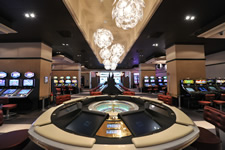Facing growing competition from the street market and online gaming, Italy's Casino de Vallee is seeking to assert itself in this changing landscape

Italy has just four casinos - Campione d'Italia, De la Vallee, San Remo and Venezia - and few anticipate any new licences being issued in the near future. That the country continues to be spoken of as one of the most potentially lucrative gambling markets in Europe, though, says much for the scope of the government's recent strategy for liberalisation.
The introduction of video lottery terminals on a scale unheard of anywhere else in Europe and the opening of the country's online gambling sector have been welcomed by equipment manufacturers and service providers alike, many of whom are shifting their focus away from other jurisdictions in order to make the most of these new opportunities. These developments have also opened the door to new ways for Italians to gamble at higher stakes locally. Yet, despite suggestions to the contrary, it is a real concern for the casinos.
With an economy struggling to keep afloat, operating conditions for Italy's casino operators have been challenging in recent years. European Casino Association figures show that revenues were down 21 per cent in 2010 at €497m but this was nothing compared to 2009 when revenues crashed 47 per cent. This new competition from VLTs and the internet is unsurprisingly not an appealing prospect.
Casino de la Vallee is located in Saint-Vincent, a little spa town in the Aosta Valley in Italy's north-west corner. Surrounded by Europe's highest peaks - Monte Bianco, Cervino, Grand Paradiso and Monte Rosa - the casino lies close to the borders of France and Switzerland. The casino, which was founded in 1947, boasts a four-star hotel, a convention centre, four restaurants and a concert hall.
Casino de la Valle director, Luc Frigerio, says the business has been seeking to strike the correct balance between its gambling and entertainment offerings, catering to both Italian guests and tourists.
“Within a 200km range, we play the 'big fight' where the four Italian casinos are all involved every day in attracting VIP customers,” he tells InterGaming. “To compete in this market is very expensive and so we need to offer them a large range of facilities, from the hotel to air tickets, from gifts for their companions to a wide offering of shows, gaming tournaments and events. In effect, we have progressively changed our mission from being a gaming operator to an entertainment operator.”
Inexpensive air travel means Italian players can spend their euros elsewhere in Europe, but this too, says Frigerio, is a chance for Italy's casinos to “grasp the opportunity” and bring foreign customers through the door.
Fighting over VIP customers is only one part of the battle, particularly as the casino business makes the transition from gambling to entertainment. Mass-market customers are now growing in importance. It is here, however, that the country's weak economy puts pressure on Italy's land-based casinos. Gambling, as in so many other jurisdictions, is viewed by the government as a relatively accessible source of tax revenues, hence the rollout of 56,000 new VLTs to the street market.
“It is not only the economic downturn that has affected the market in Italy in recent years, but also the large liberalisation of the gaming offer provided by the Italian government,” explains Frigerio. “Italian casinos have had and are continuing to face new and increasingly fierce competition from slot machines and VLTs distributed throughout the country. With ever-changing rules according to the financial needs of the country, it is the worst way to manage long-term strategies and investments for us.
“For sure, the impact will be significant and there will be tough competition. I really expect bad effects, particularly on gross gaming revenue from electronic games.”
There are also concerns about how this move to open up both the street and online gaming markets will impact problem gambling. As Frigerio points out, casinos can assure protection for compulsive gamblers and to minors through controls at the point of entry. Will these new VLT operators do the same? “I'm not sure that same attention will be assured outside our market,” he says.
Having experienced a dramatic fall in revenues since 2007, Italy's casinos look to be facing an uphill struggle to achieve profitability in light of new, country-wide competition. It is challenging, no doubt, but not impossible. Frigerio is determined to see Casino de la Vallee continue to operate successfully, even if this means additional investment in the property.
“For now the liberalisation of gaming, the economic downturn and video lottery terminals mean the real challenge is to ensure a future for the company,” he states. “By that I mean we are compelled to invent and promote new marketing strategies because the gaming offer is no longer enough to attract people.”
With this in mind, the casino is investing over €40m to renovate the hotel and gaming facilities to transform it into what he describes as a “real resort.” Perhaps the key to the casinos' longevity will be the fact that no other gaming properties in Italy can offer the same live gaming experience to their customers.
“Slot machines represent our customers' favourite games, but in Saint-Vincent we have always protected, particularly with strong marketing investments, the traditional games such as roulette, baccarat and blackjack,” says Frigerio. “For us, these games are still popular and absolutely profitable.
“Looking to the future, I think that, with an increasing availability of electronic and online games, casinos will be distinguishable within the marketplace against the offer from other operators, able to provide a unique, emotive and amusing atmosphere like no other.”

